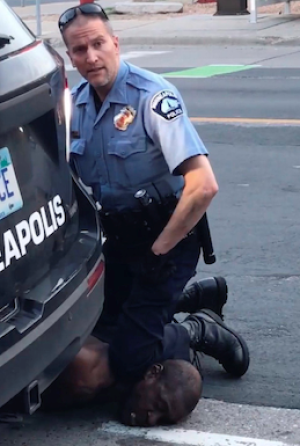The clamor for fundamental reform of American policing, including the prosecution of the war on drugs, is growing.
Pretty quiet on the medical marijuana front this week, but a Louisiana medical marijuana expansion bill has made its way through the legislature, and more.
ronavirus is having differential impacts on the illicit drug trade, Michigan groups push to end the state's drug felon foodstamp ban, Colombian rebels call for a coronavirus ceasefire, and more.
West Coast pot shops get trashed in the upheaval gripping the land, a dozen members of Congress file a resolution calling for an end to police brutality and the war on drugs, the Louisiana legislature has been busy passing marijuana bills, and more.
An Arizona poll shows strong support for a marijuana legalization initiative there, a Connecticut panel approves adding two new qualifying conditions for medical marijuana, and more.
The ACLU issues a timely report, Human Rights Watch and Amnesty International call for reforms of Cambodia's drug detention centers, and more.
As protests erupted across the country after the killing of George Floyd by Minneapolis police officer Derek Chauvin, a dozen progressive Democratic House members filed a resolution May 29th condemning police brutality not only in the case of Floyd but also in the case of Breonna Taylor, the black, 26-year-old Louisville EMT who was gunned down in her own home by cops on a misbegotten no-knock drug raid.

George Floyd's death at hands of white Minneapolis police officers (Wikipedia)
Those House members leading the resolution are Reps. Karen Bass (D-CA), Barbara Lee (D-CA), Ilhan Omar (D-MN), and Ayanna Pressley (D-MA. Additional cosponsors include Reps. Joaquin Castro (D-TX), Katherine Clark (D-MA), Joseph Kennedy III (D-MA), James McGovern (D-MA), Alexandria Ocasio-Cortez (D-NY) and Rashida Tlaib (D-MI).
"For too long, Black and brown bodies have been profiled, surveilled, policed, lynched, choked, brutalized and murdered at the hands of police officers," Congresswoman Pressley said in a statement announcing the resolution. "We cannot allow these fatal injustices to go unchecked any longer. There can be no justice for George Floyd, Breonna Taylor, or any of the human beings who have been killed by law enforcement, for in a just world, they would still be alive. There must, however, be accountability."
"From slavery to lynching to Jim Crow, Black people in this country have been brutalized and dehumanized for centuries," said Congresswoman Omar. "The war on drugs, mass criminalization, and increasingly militarized police forces have led to the targeting, torture and murder of countless Americans, disproportionately black and brown. The murder of George Floyd in my district is not a one-off event. We cannot fully right these wrongs until we admit we have a problem. As the People's House, the House of Representatives must acknowledge these historical injustices and call for a comprehensive solution. There are many steps on the path to justice, but we must begin to take them."
The resolution has broad support from racial and social justice organizations, including the Leadership Conference on Civil and Human Rights, National Action Network, NAACP Legal Defense and Educational Fund, ACLU, ACLU of Massachusetts, ACLU of Minnesota, the Justice Collaborative, Color of Change, the National Urban League, Lawyers for Civil Rights, Black and Pink, Boston Chapter, Center for Popular Democracy, Moms Rising, the Drug Policy Alliance, New Florida Majority, PolicyLink, the National Black Police Association, and The Vera Institute of Justice.
The unjustifiable deaths of African-Americans Floyd and Taylor at the hands of white police are, though, just the tip of an iceberg of official oppression and heavy-handed, militarized policing whose brunt is felt most keenly in the country's black and brown communities, but whose breadth encompasses almost all of us. And while protesters shout the names of Floyd and Taylor, the demand for unbiased, accountable policing goes far beyond these latest manifestations of cop culture run amok.
The prosecution of the war on drugs, with its racially biased arrest, prosecution, and imprisonment of people of color and its devastating impact on minority communities, is a major driver of fear and loathing for and distrust of police, the resolution cosponsors argued.
"[T]he system of policing in America, and its systemic targeting of and use of deadly and brutal force against people of color, particularly Black people, stems from the long legacy of slavery, lynching, Jim Crow laws, and the War on Drugs in the United States and has been perpetuated by violent and harmful law enforcement practices," they wrote. "[P]olice brutality and the use of excessive and militarized force are among the most serious ongoing human rights and civil liberties violations in the United States and have led to community destabilization, a decrease in public safety, and the exacerbation of structural inequities."
Contemporary police practice, with its emphasis on low-level enforcement (such as arresting more than a million people a year for simple drug possession), along with the militarization of police "has led to mass criminalization, heightened violence, and mass incarceration that disproportionately impacts Black and Brown people," they note.
The toll from law enforcement malpractice is staggering, the representatives argued: "[P]olice brutality and the use of excessive force have robbed countless communities of precious lives, have inflicted intergenerational harm and trauma to families, and are intensifying our Nation's mental health crisis." And, they charge, the cops are literally getting away with murder: "[P]olice in the United States, through acts of brutality and the use of excessive force, kill far more people than police in other comparable nations and have been historically shielded from accountability."
The resolution "condemns all acts of brutality, racial profiling, and the use of excessive force by law enforcement and calls for the end of militarized policing." It also "supports strengthening efforts to eliminate instances of excessive use of force, and conduct stringent oversight and independent investigations into instances of police brutality, racial profiling, and excessive use of force, and hold individual law enforcement officers and police departments accountable."

Breonna Taylor was shot and killed by Louisville police in a fatally bungled no-knock drug raid in March. (family photo)
To that end, the resolution calls on the Justice Department to return to its once proactive role in investigating incidents of police brutality, violence, and racial profiling and police departments that have a pattern of civil rights violations -- a feature of the Obama administration Justice Department that was overturned under Trump.
That would include having the DOJ actively challenge courts "to reconsider decisions that permit unreasonable and excessive police practices," effectively enforce consent decrees with police departments that have been caught misbehaving, and establish civilian review boards that are not mere paper tigers.
"Over the last few months, we have witnessed heightened violent acts of white supremacy, police brutality and targeted harassment because we were simply living while Black," said Congresswoman Bass, chair of the Congressional Black Caucus. "And over and over again, offenders go unpunished, allowing this vicious cycle to continue with impunity. We cannot move forward as a nation until what has broken is fixed."
"George Floyd's tragic murder shows how much work we have to fix the relationships between law enforcement and black and brown people," said Congresswoman Lee. "We have seen far too many young men and women of color murdered by police, for as little as driving their car, riding public transportation, having a cell phone, or just being in their own homes. Police officers are supposed to defuse violence -- not inflict it on black and brown communities. While the majority of police officers approach their job in a professional manner, we cannot allow black and brown bodies to be targeted, attacked, and killed with impunity. It's going to take a lot of work and a serious reckoning with our society's ingrained racial biases to stop this violence. We need to restore the proper role of police in our community -- as public servants who are here to protect everyone, not just those they deem worthy of protection. Being Black in America should not be a death sentence."
If the House adopts this resolution, it puts itself squarely on the side of the growing clamor to rein in out of control police. The resolution now has a number, House Resolution 988, and in the days since it was introduced, the number of cosponsors has jumped to 50. That's a start. Now, it's up to the House leadership to see that it moves -- and to show that Congress is finally beginning to grapple with an epidemic of racially-biased, drug war-fueled police thuggery.
back to top
Pretty quiet on the medical marijuana front this week, but a Louisiana medical marijuana expansion bill has made its way through the legislature, and more.
ConnecticutConnecticut Legislative Committee Gives Final Approval for Two New Qualifying Conditions. The legislature's medical marijuana Regulation Review Committee has given final approval to adding chronic pain and Ehlers-Danlos syndrome, an inherited disorder that weakens the body's connective tissues. The additions were approved during a Tuesday video conference. The decision follows the recommendation of the state Medical Marijuana Program's Board of Physicians.
Louisiana
Louisiana Legislature Passes Medical Marijuana Expansion Bill. With a final vote in the House on Sunday, the legislature gave final approval to House Bill 819, which would allow doctors to recommend medical marijuana for any debilitating medical conditions. It now goes to the desk of Gov. John Bel Edwards (D).
back to top
Coronavirus is having differential impacts on the illicit drug trade, Michigan groups push to end the state's drug felon foodstamp ban, Colombian rebels call for a coronavirus ceasefire, and more.

Coca prices are down because of the pandemic, but the cocaine trade keeps on keeping on. (Pixabay)
Arkansas Marijuana Legalization Initiative Campaign Gets Boost from Federal Judge's Signature-Gathering Ruling. A federal judge ruled Monday that a marijuana legalization initiative campaign, Arkansans for Cannabis Reform, can do electronic signature-gathering because of excessive burdens on in-person signature-gathering due to coronavirus pandemic social distancing. The judge ruled that the secretary of state must accept signatures not gathered in person or notarized. The campaign says it was on a path to gather sufficient signatures before in-person signature-gathering was suspended. It has until July 3 to hand in signatures.
Drug Policy
Michigan Bill Would Hike Heroin, Fentanyl Sales Penalties. State Rep. Brian Elder (D-Bay City) has filed a bill, HB 5627, that would increase penalties for the manufacture and delivery of heroin, fentanyl, and other synthetic opioid drugs. The bill is now before the House Judiciary Committee.
Michigan Groups Call on Governor to End Food Stamp Ban for Drug Felons. A coalition of 25 organizations led by the Center for Employment Opportunities is calling on Gov. Gretchen Whitmer (D) and legislative leaders to end a longtime state policy that permanently bans residents with two or more drug felony convictions from receiving food stamps. The ban is federal, but most states have already moved to receive waivers to avoid enforcing it. The groups say the ban makes it more difficult for people to make the transition from prison to civilian life.
International
Coronavirus Drives Dealers Online as Drugs Supply Soars. The cyber intelligence company Sixgill is reporting that dark web drug sales offers soared nearly 500% over the first few months of this year as drug dealers took to the web to continue doing business in a time of social distancing. The number of drug items for sale on dark websites monitored by Sixgill jumped from 4,154 in December 2019 to more than 24,000 by April 2020. MDMA postings more than doubled, marijuana postings increased more than five-fold, and cocaine postings jumped 10-fold. "Feedback, while an imperfect metric for purchase volume, is a reliable indicator of the rate of transactions," Sixgill explained. "Feedback volume for cannabis, cocaine, and MDMA all nearly doubled over the past half year."
Coronavirus Hits the Cocaine Supply Chain. The coronavirus pandemic is destabilizing the delicate balance in the Andes that the cocaine trade relies on. Lockdowns enforced by soldiers and police have caused trafficking routes to constrict, driving down the price of coca for the more than 237,000 families in Colombia, Peru, and Bolivia who depend on it. In the latter two countries, the price of coca has dropped to from one-third to one-sixth of previous levels. "We're concerned about feeding our families because the price of coca continues to drop," said Bolivian coca union leader Albino Pinto. "We face restrictions in moving coca and other goods to the central market. This is blocking both local consumption and export, but our production continues at the same level." But the cocaine trade continues: "Drug traffickers have become more agile in shifting routes and modifying strategies," according to Kathryn Ledebur of the Andean Information Network. "Given the harsh reality for those who survive at the lowest rungs of the cocaine trade, pandemic control, just like drug control doesn't stop this business."
Colombia ELN Rebels Would Back Temporary Ceasefire to Help Contain Spread of Coronavirus. The National Liberation Army (ELN), which remains in rebellion against the government in Bogota and is involved in coca and cocaine production, has said it would be willing to take part in a three-month ceasefire to help quash the coronavirus. United Nations Secretary General Antonio Guterres called for a global ceasefire back in March. The ELN said it was waiting for a response from the government of President Ivan Duque.
back to top
West Coast marijuana stores get looted in the upheaval gripping the land, a dozen members of Congress file a resolution calling for an end to police brutality and the war on drugs, the Louisiana legislature has been busy passing marijuana bills, and more.

A dozen members of Congress call for an end to police brutality and the war on drugs. (Pixabay)
California, Oregon Marijuana Dispensaries Hit by Looters. California and Oregon marijuana dispensaries are among the businesses hit by the wave of unrest sparked by the police killing of George Floyd in Minneapolis. A number of them have been looted and vandalized, including Harborside, Blu, ECO Cannabis, and Magnolia Wellness in Oakland, 10 dispensaries in San Francisco, and five more in Los Angeles. In Oregon, at least two dispensaries were hit in Portland and one in Oakland.
Louisiana Legislature Passes Marijuana Banking Bill. The state Senate last Friday gave final approval to House Bill 211, which would protect banks and credit unions serving marijuana businesses from facing penalties from state regulators. The bill has already passed the House, and now heads to the desk of Gov. John Bel Edwards (D).
Medical Marijuana
Louisiana Legislature Passes Medical Marijuana Expansion Bill. With a final vote in the House on Sunday, the legislature gave final approval to House Bill 819, which would allow doctors to recommend medical marijuana for any debilitating medical conditions. It now goes to the desk of Gov. John Bel Edwards (D).
Asset Forfeiture
Tennessee Civil Asset Forfeiture Reform Bill Advances in House. A minor civil asset forfeiture reform bill, House Bill 0340, was approved by the House Judiciary Committee last Friday. The bill does not ban civil asset forfeiture, but instead eliminates the requirement that someone whose property has been seized through asset forfeiture post a $350 bond to appeal that seizure. Tennessee is one of only three states that have such requirements. The bill now heads to the House Finance, Ways, and Means Committee.
Drug Policy
Congressional Resolution Condemns Police Brutality, War on Drugs. A dozen members of the House filed a resolution last Friday that condemns police brutality and the racial injustice of the war on drugs. The resolution comes in the wake of the police killings of George Floyd in Minneapolis by a police officer who suffocated him to death and Breonna Taylor in Louisville in a fatally flawed drug raid. The "system of policing in America, and its systemic targeting of and use of deadly and brutal force against people of color, particularly Black people, stems from the long legacy of slavery, lynching, Jim Crow laws, and the War on Drugs in the United States and has been perpetuated by violent and harmful law enforcement practices," the resolution says.
International
Honduras Passes Law Allowing it to Intercept Suspected Drug Smuggling Planes. In a move totally devoid of irony -- US prosecutors have accused high Honduran government officials of being corrupted by the drug trade -- the Honduran legislature has approved a law allowing security forces to intercept planes of smuggling drugs and to participate in more comprehensive intelligence sharing with the United States and other Latin American countries. Honduran officials said the law was aimed at "narco jets" mainly coming from Venezuela. The move comes as the Trump administration is increasing anti-drug operations in the Caribbean and sending US troops to Colombia.
back to top
An Arizona poll shows strong support for a marijuana legalization initiative there, a Connecticut panel approves adding two new qualifying conditions for medical marijuana, and more.

Connecticut opens the door to two more qualifying conditions for medical marijuana. (Sandra Yruel/DPA)
Arizona Poll Has Near Two-Thirds Support for Marijuana Legalization. If the Smart and Safe Arizona marijuana legalization initiative campaign can manage to make it onto the November ballot, a new poll suggests its prospects for victory are very good. The poll, from the lobbying and consulting firm HighGround, had support for the measure at 65%, with just 25% opposed. The polling came after respondents were given a detailed description of the initiative, as opposed to a generic question.
Medical Marijuana
Connecticut Legislative Committee Gives Final Approval for Two New Qualifying Conditions. The legislature's medical marijuana Regulation Review Committee has given final approval to adding chronic pain and Ehlers-Danlos syndrome, an inherited disorder that weakens the body's connective tissues. The additions were approved during a Tuesday video conference. The decision follows the recommendation of the state Medical Marijuana Program's Board of Physicians.
International
China Announces More Than 11,000 Arrests in Anti-Drug Campaign That Began in January. The Chinese narcotics control authority has reported more than 11,000 arrests in a yearlong anti-drug campaign that was launched in January. The campaign is aimed at Yunnan Province in southwestern China, which borders Southeast Asia's Golden Triangle of opium production. By contrast, the US arrests more than a quarter-million for drug offenses arrests during the same period each year.
back to top
The ACLU issues a timely report, Human Rights Watch and Amnesty International call for reforms of Cambodia's drug detention centers, and more.

Black Americans are more than three times more likely to get busted for pot, a new ACLU report finds. (Creative Commons)
New ACLU Report Highlights Racial Bias in Marijuana Policing. The new report, A Tale of Two Countries: Racially Targeted Arrests in the Era of Marijuana Reform, details millions of racially targeted marijuana arrests made between 2010 and 2018. The report shows that Black people are 3.64 times more likely than white people to be arrested for marijuana possession despite comparable marijuana usage rates. Additionally, although the total number of people arrested for marijuana possession has decreased in the past decade, law enforcement still made 6.1 million such arrests over that period, and the racial disparities in arrest rates remain in every state.
Marijuana Shops Across the Country Close Doors After Looting. Pot shops from Oregon and California to Massachusetts and Florida are temporarily closing their doors to customers after dozens of them were hit by looters and vandals amidst the chaos of mass protests over the police killing of George Floyd. Among those closed are 30 stores belonging to MedMen, which said its shops are indefinitely closed. Cresco Labs, which operates shops in six states, said it had temporarily closed its three Illinois locations after one was attacked Saturday night.
Drug Policy
The DEA Has Been Given Permission to Investigate People Protesting George Floyd's Death. The Justice Department has given the DEA the temporary power "to enforce any federal crime committed as a result of the protests over the death of George Floyd." That would allow the federal dope cops to "conduct covert surveillance" and collect intelligence on people taking part in protests over the killing. Floyd's death "has spawned widespread protests across the nation, which, in some instances, have included violence and looting," the DEA memo says. "Police agencies in certain areas of the country have struggled to maintain and/or restore order." The memo requests the extraordinary powers on a temporary basis, and on Sunday afternoon a senior Justice Department official signed off.
International
Cambodia Criminal Justice Reforms Should Go Further, Human Rights Groups Say. Amnesty International and Human Rights Watch have called on the Cambodian government to go further than its stated plan to tackle prison overcrowding and related human rights abuses in the country's criminal justice system. The reforms announced so far have neglected the ongoing human rights crisis in the country's notorious drug detention centers, which are overcrowded, plagued by torture, and present significant risks of coronavirus infection.
back to top






